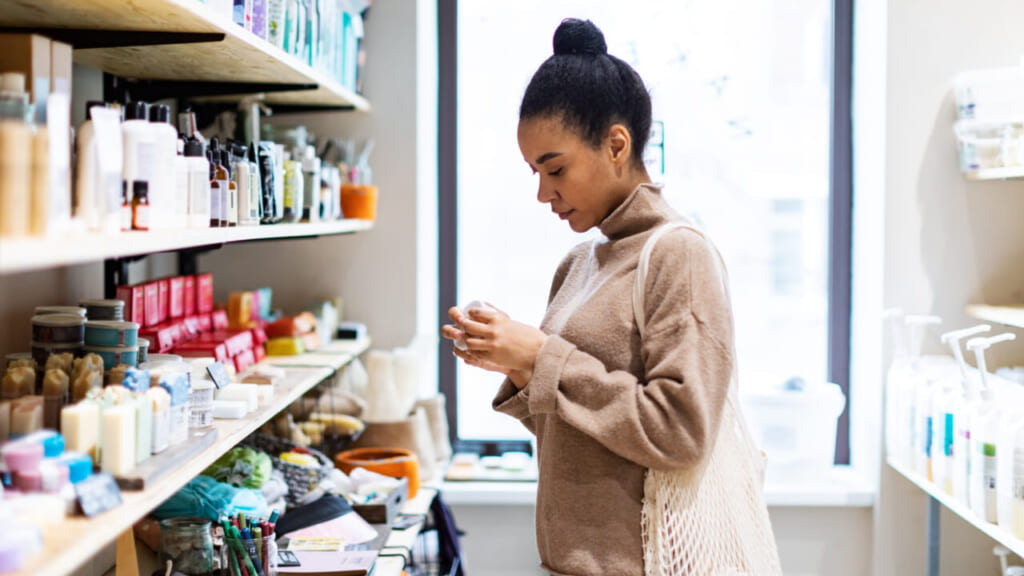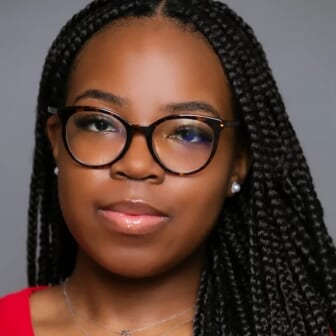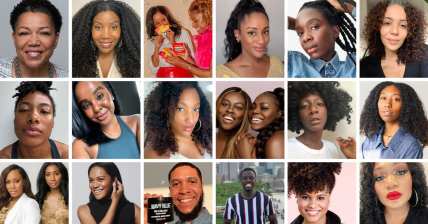Shop Black-owned beauty to help bridge the gap beyond Black Business Month
Want to make a beautiful impact on the success of Black-owned businesses? Start with Black-owned beauty products.
All August, we’ve been minding our Black, beautiful business in celebration of Black Business Month—and if you weren’t already aware, beauty is big business, netting $511 billion in 2021. Historically, the Black community had a strong influence on beauty trends; from bold nail designs to makeup looks and hairstyles, we are often the innovators. Yet despite our major influence and spending power, Black people’s experiences in the beauty world largely remain frustrating, and Black-owned beauty brands remain underrepresented in store aisles.

A recent study by McKinsey showed Black consumers spent $6.6 billion on beauty products in 2021, making up 11% of the $60 billion beauty industry in the U.S. Yet despite the strong presence of Black consumers, Black brands only make up 2.5% of total beauty industry revenue. In fact, McKinsey found that Black beauty brands raise $13 million in venture capital on average, compared to the $20 million most non-Black brands have as start-up capital. There are further reasons for this disparity, including lack of marketing and inequities in accessibility—yet the fix is simple.
“Consumers are saying they want to buy products from Black founders and from people of color in general. Retailers want people to shop in their stores,” says McKinsey senior partner & author of the ‘Black representation in the beauty industry’ study, Tiffany Burns on the McKinsey on Consumer and Retail podcast. “So they’re going to need to carry the products that people want.”
While beauty retailers like Ulta Beauty and Sephora have committed to supporting Black-owned/founded brands, only 4-7% of beauty brands found in specialty beauty stores, drugstores, grocery stores, and department stores are Black brands. Retailers must accommodate Black consumers’ needs as the study found that a more equitable beauty market could result in a 39% increase in Black spending by 2025.
“We’re going to see growth in the Black consumer segment over the next ten years. Underneath it all, it’s good business. So this is not just a good thing to do—it’s a good business thing to do,” says Burns.
With that in mind, here are six Black-owned/founded beauty tools we think should be on every beauty retailer’s shelves—and yours, too:
Big Mouth Toothbrush
Driven by the motto “Bigger Is Better,” Dr. Bobbi Peterson, a dentist and second-generation HBCU graduate, uses her brand to honor Black history.
As the first Black female-owned toothbrush company, Big Mouth aspires to give everyone access to “excellent dental care & a better life.” Peterson’s revolutionary electric toothbrush offers 6 cleaning options, 2 different brush head sizes, and a 9x Battery life. The Big Mouth toothbrush retails for $99.99 and is on sale now for $69.99
Buttah Vibe Brush
“We don’t want to just nurture your skin—we want you to discover the beauty that lies within.”
Founded in 2018 by Dorion Renaud, Buttah Skin offers unisex products that help users tackle dryness, discoloration, oiliness, and blemishes with simple, proven-effective, clinically tested, natural, cruelty-free ingredients. Their water-resistant, antimicrobial silicone Buttah Vibe Brush ($49) gently exfoliates facial skin, eliminating dead skin cells and dullness through sonic pulsating technology. Sending up to 10,000 pulses per minute, the Buttah Vibe enhances the cleansing experience by sending “good vibe-rations for your skin.”
EAP Heat
Whether you’re natural or relaxed, EAP Heat offers professional-grade heat styling tools and products directly to consumers. Helping you maintain that fresh-out-of-the-salon look, the brand sells titanium and ceramic styling tools for various hair types and product bundle deals that range from $45 – $937.
Oui The People
This gender-inclusive grooming company is reconstructing beauty as we know it. Through the creation of effective, sustainable, and thoughtfully designed products, Oui The People’s CEO and founder Karen Young hopes to both help the planet and help her customers feel great in the skin they’re in. The brand is best known for its weighted stainless steel rose gold razor ($75), but also sells other body care products ranging from $11 – $139.
Briogeo’s Scalp Revival Stimulating Therapy Massager
On a mission to empower every person to succeed in the healthy hair journey, Briogeo founder and CEO Nancy Twine aspires to make an impact on the natural beauty industry through her cruelty-free, vegan, gluten-free, and 6-free (no DEA, harsh sulfates, silicones, parabens, artificial dyes Phthalates) formulas.
Briogeo’s Scalp Revival Stimulating Therapy Massager helps users improve scalp circulation and general hair health regardless of their hair texture. This hand-held tool can be used with or without product on wet or dry hair and is also safe on color and chemically-treated hair.
LA Beautyologist’s ShowerChic Collection
Now we all know, that washing your face is not as glamorous as the commercials make it seem; water can get everywhere (and I mean everywhere!). Licensed esthetician and skin care influencer Nayamka Roberts-Smith (@labeautyologist) created accessories that protect both your edges and your clothes from any overflow that might occur while washing your face. The LABeautyologist ShowerChic collection is made of soft velvet microfiber, recreating luxury, spa-like experiences at home. The ‘Edges Saver Satin Headband’ and ‘No Drip Cleansing Cuffs’ keep your hairline dry and enable a drip-free facial cleansing experience. The collection’s prices range from $24 – $98.

Haniyah Philogene is a multimedia storyteller, on-air personality and social media coordinator using her voice, talents, and creativity to enact change in the media industry.
TheGrio is FREE on your TV via Apple TV, Amazon Fire, Roku, and Android TV. TheGrio’s Black Podcast Network is free too. Download theGrio mobile apps today! Listen to ‘Dear Culture’ with Panama Jackson.


